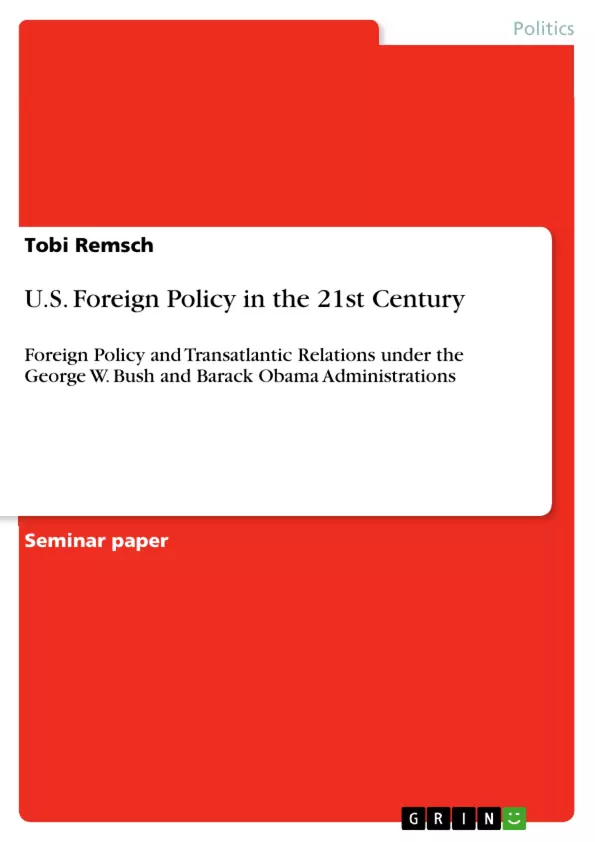10 years ago, almost to the day, terrorists hijacked 4 four planes, flying two of them into the Twin Towers of the World Trade Center and one into the Pentagon. The fourth airliner came down in rural Pennsylvania, when travelers tried to regain control of the cockpit. Almost 3000 people lost their lives in the attacks on September 11, 2001, when the Islamist group al-Qaeda put an early end to what seemed like the beginning of an era of unprecedented peace and security for the United States of America.
After the breakup of the Soviet Empire and the end of the Cold War, the USA has emerged as the world’s lone superpower, with no rival state possessing sufficient military, economic or technological strength to impose a serious threat on them. American foreign policy, whose focal point had been the containment of Soviet power for over 40 years, became less important and the public interest focused on domestic issues.
How did the end of the Cold War era and the terrorist threat affect American Foreign Policy? Three years after the election of Barack Obama, this paper aims at contrasting the administrations of both the American presidents of the 21st century in regard to their foreign policy making on the one hand, and the consequent transatlantic relations on the other. What are the specific characteristics of Bush’s and Obama’s approach to foreign policy problems? What are the differences and similarities? In what way have both presidents shaped the relations to international organisations as well as their allies in Europe?
Inhaltsverzeichnis (Table of Contents)
- Introduction
- What is American Foreign Policy about?
- The George W. Bush Administration
- September 11 and the War on Terror
- The Bush Doctrine
- International and Transatlantic Relations
- The Second Bush Term
- The Barack Obama Administration
- Post-Bush Foreign Policy
- The 'Global War on Terror' Continues
- Continuity and Change 2009-2011
- Transatlantic Relations
- Conclusion
- The Future of American Foreign Policy
Zielsetzung und Themenschwerpunkte (Objectives and Key Themes)
This paper aims to contrast the foreign policy approaches of the George W. Bush and Barack Obama administrations, examining their impact on transatlantic relations. The paper analyzes the similarities and differences in their approaches to foreign policy problems, particularly their interactions with international organizations and European allies. Additionally, the paper explores the long-term implications of these approaches for the future of American foreign policy.- The impact of September 11th on American foreign policy
- The Bush Doctrine and its influence on foreign policy
- The evolution of transatlantic relations under the Bush and Obama administrations
- The continuity and change in American foreign policy from the Bush to the Obama era
- The future of American foreign policy and its potential implications for global relations
Zusammenfassung der Kapitel (Chapter Summaries)
The introduction presents a historical context for the study, highlighting the impact of the September 11th attacks on American foreign policy. The chapter examines the shift in public opinion towards foreign affairs and the evolution of the United States as a global superpower.
Chapter two delves into the concept of American foreign policy, defining its scope and outlining the key factors that have shaped its trajectory. The chapter explores the debate regarding the balance between promoting American interests and spreading American values, as well as the question of unilateralism versus multilateralism in foreign policy.
Chapter three focuses on the George W. Bush administration, examining its response to the September 11th attacks, the development of the Bush Doctrine, and its impact on international and transatlantic relations. This chapter also explores the administration's approach to the "War on Terror" and its domestic and foreign policy implications.
Chapter four analyzes the Barack Obama administration's foreign policy, contrasting it with the Bush administration's approach. The chapter discusses Obama's focus on multilateralism and diplomacy, his approach to the "Global War on Terror," and the improvements in transatlantic relations during his presidency.
The conclusion draws upon the previous chapters to offer a comprehensive overview of American foreign policy in the 21st century. It highlights the evolving nature of foreign policy and its impact on global relations, providing insight into potential future developments.
Schlüsselwörter (Keywords)
This paper explores the key themes of American foreign policy, transatlantic relations, the "War on Terror," the Bush Doctrine, and the contrasting approaches of the George W. Bush and Barack Obama administrations. The paper focuses on the impact of these approaches on international organizations and European allies, offering valuable insights into the dynamics of global power and international relations.Frequently Asked Questions
How did 9/11 change American Foreign Policy?
The terrorist attacks of September 11, 2001, ended the post-Cold War era of domestic focus and shifted the U.S. toward the "War on Terror" and a more interventionist stance.
What is the "Bush Doctrine"?
The Bush Doctrine emphasized unilateralism, preemptive strikes against perceived threats, and the goal of spreading democracy in the Middle East.
How did Obama's foreign policy differ from Bush's?
While Obama continued aspects of the War on Terror, he shifted toward multilateralism, diplomacy, and repairing strained transatlantic relations with European allies.
What was the state of transatlantic relations in the 21st century?
Relations were highly strained during the Bush era due to the Iraq War but saw significant improvement and increased cooperation under the Obama administration.
Did Obama truly end the "Global War on Terror"?
The paper analyzes how the "Global War on Terror" continued under Obama, though with different strategies and a focus on multilateral engagement.
- Quote paper
- Tobi Remsch (Author), 2011, U.S. Foreign Policy in the 21st Century, Munich, GRIN Verlag, https://www.grin.com/document/209058



